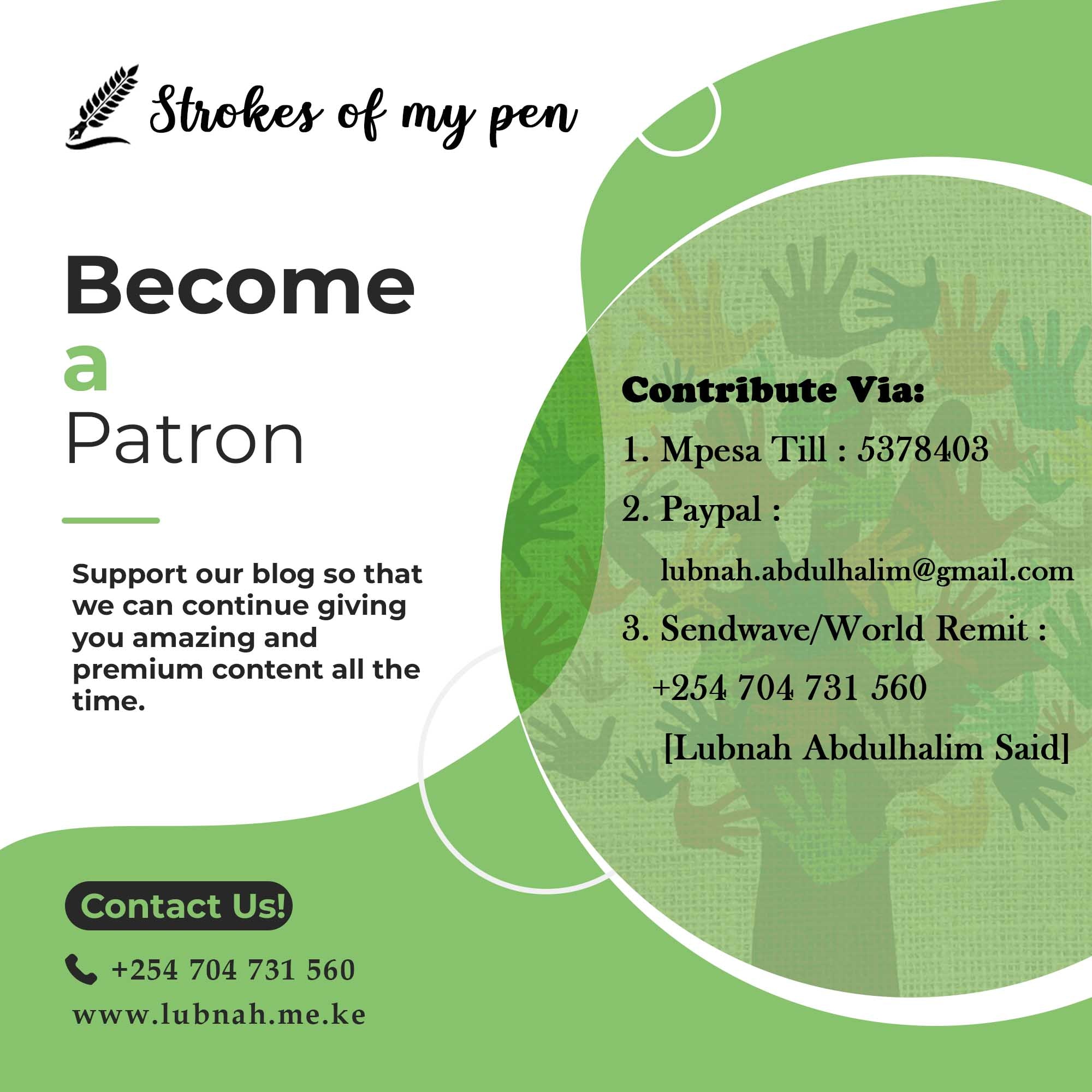“A man asked a shaykh what advice can you give me on how to do tarbiyah on my son. The shaykh asked him, how old is your son and he replied, he is only two months old. The shaykh replied, ‘You are late, you have already missed the train. The best time to seek advice on tarbiyah of your child is when you were ready to choose a spouse because true tarbiyah starts by choosing a righteous spouse for your children.”
(Quoted from Ibn Qayyim’s book by Ahlul-Athar twitter page)
I recently started doing a marriage course at Al-Maghrib institute called ‘Fiqh of Love’, one of the most eye-opening and thought-provoking courses I have ever come across. If it was possible, I’d advise every single Muslim to take the course because it not only covers in-depth Islamic aspects and rulings on marriage but psychological ones as well. I just HAVE TO share some very important tips shared, especially on how to choose a spouse.
*Please note some of the views that will be shared are my own.*
So let’s start from the beginning:
LOVE
First of all, remove it from your mind that love is everything you need to sustain a marriage. That is an unrealistic view that’s very commonly romanticized in our society. Love is important yes, it nurtures a marriage yes, it brings out the most beautiful aspects of marriage yes…but is it the only thing you need to take with you into marriage? Absolutely not!
It is natural for people to feel some attraction, chemistry or connection towards another, and that is counted as the initial stage of love. Now during this phase, a lot of happy chemicals take over our bodies and bring out the excitement in us. And as these hormones continue existing in us, most often than not, people tend to become blinded by the other person’s character traits and behaviour.
According to sciencedaily.com, in an article named ‘What falling in love does to your heart and brain’ the writer states:
“MRI scans indicate that love lights up the pleasure center of the brain. When we fall in love, blood flow increases in this area, which is the same part of the brain implicated in obsessive-compulsive behaviors.
“Love lowers serotonin levels, which is common in people with obsessive-compulsive disorders,” said Mary Lynn, DO, co-director of the Loyola Sexual Wellness Clinic and assistant professor, Department of Obstetrics & Gynecology, SSOM. “This may explain why we concentrate on little other than our partner during the early stages of a relationship.”
Doctors caution that these physical responses to love may work to our disadvantage.
“The phrase ‘love is blind’ is a valid notion because we tend to idealize our partner and see only things that we want to see in the early stages of the relationship,” Dr. Mumby said. “Outsiders may have a much more objective and rational perspective on the partnership than the two people involved do.”
You will sometimes find people who were once very deeply in love eventually end up in resentment over the same traits that initially attracted them to each other. For example, a woman could admire how charismatic, charming and outgoing a man is and choose to marry him for such traits. However, once the happy hormones have subsided, the lady starts getting irritated and feeling insecure when she realizes that the man is not just charming to her alone. She’d probably become overly jealous when she sees him interact with other people and how much attention he gets. And maybe the man doesn’t really have strict boundaries with others and this might agitate the lady. Mind you, these were the same traits she adored in him at the start, she knew how much attention he was getting but because she didn’t actually evaluate whether that personality will work with her overly jealous one, it brings out resentment in her.
Please note that I am not in any way saying that a charming individual is the wrong choice of spouse lol, nor am I saying it is okay to be overly jealous or violate boundaries…but rather, from the beginning, let not love blind you from critically thinking about your choices. You have to be self-aware about your own strengths, weaknesses, what exactly you need in a partner and be practical in how you make those choices.
There is this one very deep and profound quote by a poet called Taylor (from Unicorn Empire on Tumblr: https://bit.ly/3CQucqX) that moves me every.single.time!
“A lot of people ask me what my biggest fear is, or what scares me most. And I know they expect an answer like heights, or closed spaces, or people dressed like animals, but how do I tell them that when I was 17 I took a class called Relationships For Life and I learned that most people fall out of love for the same reasons they fell in it. That their lover’s once endearing stubbornness has now become refusal to compromise and their one track mind is now immaturity and their bad habits that you once adored is now money down the drain. Their spontaneity becomes reckless and irresponsible and their feet up on your dash is no longer sexy, just another distraction in your busy life.
Nothing saddens and scares me like the thought that I can become ugly to someone who once thought all the stars were in my eyes.”
In a follow-up post after the above trended on Tumblr, Taylor said:
“After my teacher introduced us to this theory, she asked us, “is love a feeling? Or is it a choice?” We were all a bunch of teenagers. Naturally, we said it was a feeling. She said that if we clung to that belief, we’d never have a lasting relationship of any sort.
She made us interview a dozen adults who were or had been married and we asked them about their marriages and why it lasted or why it failed. At the end, I asked every single person if love was an emotion or a choice.
Everybody said that it was a choice. It was a conscious commitment. It was something you choose to make work every day with a person who has chosen the same thing. They all said that at one point in their marriage, the “feeling of love” had vanished or faded and they weren’t happy. They said feelings are always changing and you cannot build something that will last on such a shaky foundation.
The married ones said that when things were bad, they chose to open communication, chose to identify what broke and how to fix it, and chose to recreate something worth falling in love with. The divorced ones said they chose to walk away.
Ever since that class, I have never looked at relationships in the same way again. I understood why arranged marriages worked. I discovered the difference between feelings and commitments. I’ve never gone for the person who makes my heart flutter or my head spin. I’ve chosen people who were committed to choosing me, dedicated to finding something to adore even on the ugliest days.
To conclude her post she added: ‘I no longer fear the day someone who I swore was the universe can no longer see stars in my eyes, as long as they still chose to look for them until they find them again.”
I think it is noteworthy to mention, Islam doesn’t reject the concept of love. It is natural and happens without our permission. Yet, what we choose to do with that love/attraction is considered our choice and responsibility. Religion gives us guidelines and limits to observe when it comes to our emotions because many times it can lead one to lose the akhera or both the akhera and dunya (May Allah protect and guide us).
There is so much wisdom in why our religion discourages emotional attachment before marriage. It is not to make us miss out on something we consider beautiful, but rather, to protect our souls from a considerable amount of pain and heartbreak that can be avoided.
Imam Ahmad said: “Don’t expose yourself to what you cannot handle.” Sometimes we think we’re smarter than everyone else and can handle whatever happens. But the reality is, we’re human beings and we all are weak to some extent. When Allah asked us to lower our gaze and protect our private parts, it was because HE KNOWS that that can be the greatest source of pain and despair for humankind.
Going back to the initial point on how love can blind us from being practical and realistic, the shaykh mentioned during the course, an incident that happened between a Muslim lady coming from a very rich background and a Muslim man who was struggling to make ends meet. The two fell in love and the man approached the girl’s family to propose to her. The family were against the marriage because they felt that the man wouldn’t be able to give their daughter the same kind of lifestyle and comfort she had at her father’s home. Mind you, this girl came from a wealthy family such that they had two house helps, and one of them was dedicated to serving the lady alone.
Despite the family’s objection, the girl insisted that she wanted the same man to be her husband. She said she doesn’t mind if he is poor. She is ready to eat plain bread and water. She is ready to make all sacrifices for him. The two eventually got married. After a while, the lady approaches the shaykh crying; she is pregnant and still loves her husband, but she cannot take it anymore. She is really frustrated because she is not used to doing any house chores and it is a big struggle for her. The husband on the other side is frustrated because she can’t seem to get it right and keeps comparing his wife to his mother’s abilities.
Now, we’re not saying that two people coming from different lifestyles and financial stability (or the lack thereof) can’t lead to a healthy marriage BUT it takes more than love to handle such issues. With love, people tend to think ‘we can overcome ANYTHING’. Yet for that to actually happen, more traits and actions are needed like open communication, compromise, patience, support, mercy, compassion, and kindness. If the couple had taken the time to communicate about the impending challenges before the marriage (or at least early on in the marriage) and come up with strategies and plans on how they’d cope, then maybe things would have turned out differently.
This doesn’t mean there is no hope for the couple to fix their marriage, but it always better to be proactive and prepared in such scenarios.
All we’re saying is, don’t make love your main or only criterion in choosing a spouse. Instead:
1. Work on being the right spouse: This means you actively strive for personal growth and development. Understand yourself; your needs, your strengths, your weaknesses, your preferences, your goals and what you want in life.
Questions to ask oneself include:
Am I ready for marriage? REALLY being ready for the life after marriage, not just the fun wedding part.
What are my likes and dislikes?
What are my positive and negative traits? (Be honest and realistic)
What are my weaknesses and how can I work on them?
How can I become a better human being?
What are my preferences?
How would I like my future spouse to be?
Knowing your triggers: What situations or kinds of people bring out strong (mostly negative emotions) in you? What makes you angry? What kind of person you cannot stand at all? What kind of behaviours puts you off or frustrate or irritate you?
If you already have an interest towards a person, and you’re working on being the right spouse, ask yourself: What will I contribute to this relationship? What will I be serving? Am I giving as much as I am receiving? (Those already married can reflect on these questions too).
Most importantly, have the intention of becoming the best version of yourself. Each one of us has baggage to work on, so none of us can say we have achieved the ultimate growth. We’re continuously exposed to different kinds of trauma and difficult situations that we need to learn and grow from. There is no end to the process. According to your intention, Allah will help and assist you.
2. Connect with Allah: Seek knowledge. Strive for closeness with Allah. Work on doing better and more in your ibadah. Know which ibadah uplifts you the most and use that to nurture yourself. For example, for some people, reading Qur’an brings them the most peace. For others it is praying tahajjud. For others it is charity etc. Once you identify what works best for you, use that as a tool to keep you grounded and at peace. When uplifted, you will definitely interact better with your spouse and those around you.
Allah Subhanahu Wataala says: “And be not like those who forgot Allah and He made them forget themselves.” When we’re distant from Allah, we’re distant from a crucial part of ourselves. How can we forget ourselves then expect to find a good match?
When you’re connected to Allah, you’ll choose someone connected too.
Moreover, make dua often for yourself, your future spouse and your offspring. Even if you haven’t found a person yet, pray for your future spouse; their well-being, their religiosity, their peace of mind, their growth, and their rizq. Ask Allah for what you’d love to see in them; whether character traits, personality type, piety level and even physical traits. Ask Allah to enable both of you to be wonderful spouses to each other and wonderful parents thereafter. Ask Allah for good offspring thereafter who’ll be obedient, pious, intelligent etc…whatever you want, ask Allah without limiting yourself.
3. Search for the right spouse: Find someone who will bring you closer to Allah. Someone who can be a good parent. Someone who is compatible with you. Someone who will support and help you along the way. And someone who will bring out the best in you.
Ask yourself: What exactly do I want in a spouse? Ideally, you could have a list of what your spouse MUST have, Negotiable things you want and Non-negotiables.
For example, a man says, my wife MUST observe the proper hijab, she preferably should have a university degree but if she just has a college diploma that works for me (negotiable), and she mustn’t be working in a field that requires night shifts (non-negotiable). Please note that this differs from person to person and it is okay for whichever preferences one has.
Another example, a woman says: My husband MUST have a halal income, he preferably should be a hafidh but if he isn’t, then he should at least be able to read the Qur’an fluently (negotiable), and he mustn’t have any kind of addiction (non-negotiable).
Alternatively, you could put your expectations into categories; Most important, least important and Able to compromise. The important thing is to identify these things beforehand. By the way, these lists aren’t limited to qualities and traits only. They also include physical features as well.
One interesting tip that shaykh Waleed Basyouni shared about what to do when considering a person is; look at whether the person meets the qualities you need, then have deen the last and final quality to check off. For example, a lady says I want a man who is ambitious, religious, financially stable and tall. If the man she is considering has all the above (or some, according to what is negotiable to her) then finally she considers his religiosity. Is he pious? If yes, she goes ahead. If not, she cancels the deal. This makes the process easier because sometimes you can get someone who is religious but doesn’t have the other qualities that are also important to you. So you keep deen as the final consideration to tick off for it is the most important one; the deal maker or the deal breaker.
In conclusion to this first part, do know that it is okay to fall in love but take your brain with you. Don’t get overly attached to anyone. Maintain your boundaries and protect your chastity.
Love is not always enough to sustain a marriage (or any kind of relationship).
It is also important for individuals to know the difference between love, obsession, infatuation, lust and sympathy/pity. Each individual should be able to identify and NAME which emotions they are experiencing. It gives one clarity on how to deal with those emotions once identified.
That’ll be the end of part one. Some of the points above will be talked about further in the follow-up articles of this series. Kindly subscribe below to receive the latest articles in your email box 🙂





